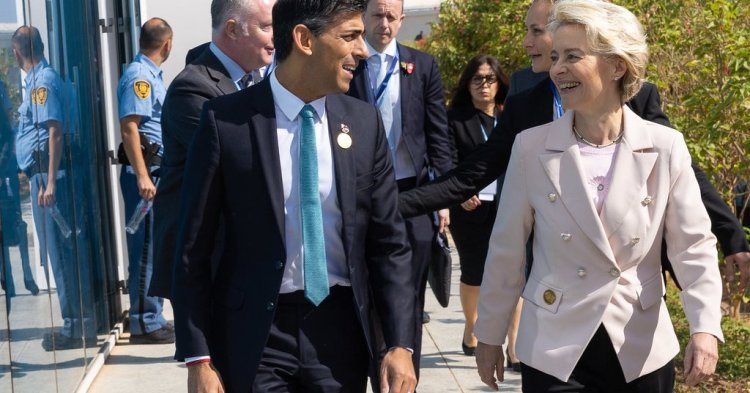On Monday, UK Prime Minister Rishi Sunak met with President of the European Commission Ursela von der Leyen to discuss the Northern Ireland Protocol. These discussions took place in Windsor, close to one of the residences of the King, resulting in deals that have been named the ‘Windsor Agreement’.
What is in the deal?
Trade
The biggest point from this deal has been the result of lengthy negotiations over the Northern Irish deal - trade between Northern Ireland and the rest of the UK [1]. After Brexit, the UK was in the situation of having a hard border with the EU at the Northern Ireland/Republic of Ireland border. While in some cases, this may have meant simple border checks like any EU/non-EU relationship, in Northern Ireland this would have proved troublesome. Because of Northern Ireland’s very recent history of political unrest and division, it is feared that borders between Northern Ireland and the Republic of Ireland would reignite any underlying tensions.
Goods that will only arrive in Northern Ireland (and therefore, remain with UK borders), will pass through a ‘green lane’ in which they will not have to face bureaucracy - while the ‘red lane’ will be for goods that have a final destination within the EU, and will be subject to normal cross-border checks. The deal will also introduce new freedoms for the movement of pets, some food, and medicines to travel from Great Britain to Northern Ireland. Mr Sunak stated that the agreement ’permanently removes any sense of a border in the Irish Sea’.
Increased power to Northern Ireland
The agreement also enhances the power of Stormont (Northern Ireland’s Assembly) to raise objections to a new goods rule, called the ‘Stormont Brake’. It will allow Northern Ireland to stop new EU single market rules from coming into effect in the country, if they decide to. However, this is not fully bindingFFF as the UK government will still hold veto power over the Stormont Brake.
A new era of EU-UK relations
The new agreement is an alteration of the previous Northern Ireland Protocol. The deal has also sparked hope for UK researchers, as President Von der Leyen said that she is ‘happy to start’ negotiations on having the UK rejoin Horizon, the one of the EU’s vast science research funding programmes. However, these negotiations will also take time, meaning that the UK and the EU will have to continue discussions.
Criticism
The Windsor Agreement has received much support, with the UK’s opposition party already saying that they will back the deal. The leader of the Scottish National Party (The UK’s third largest party in Westminster) has also expressed support for the bill, however he added that ’we cannot and we should not forget the damage which has been done by leaving the European Union’., and asked Mr Sunak why ‘Scotland does not have those same opportunities’.
The deal has also been criticised by former Prime Minister Boris Johnson, who said that he would find the deal ’very difficult’ to vote for, because it ’does not take back control’. Johnson was part of the negotiations behind the Northern Ireland Protocol after Brexit, which were famously tumultuous and complicated negotiations. The Protocol introduced checks on goods arriving into Northern Ireland from the UK, creating what the Democratic Unionist Party called: ‘[a] border in the Irish Sea’.
The DUP
The Democratic Unionist Party, Northern Ireland’s second largest political party after Sinn Féin, are boycotting Northern Ireland’s assembly at Stormont until their concerns about post-Brexit trading logistics are addressed. DUP Member of Parliament Ian Paisley told Newsnight that the deal ’does not cut the mustard’. The Northern Ireland Secretary to Westminster is due to discuss the framework with Northern Ireland’s political parties in the next few days to evaluate their response.
What next?
The Withdrawal Agreement Joint Committee will meet in the coming weeks to agree on the practical measures that must be taken to ensure the agreement can be carried forward. Meaning that, as of yet, there is no firm timeline for when the Windsor Agreement will be implemented. Despite this, and the criticisms facing the agreement, these negotiations mark an exciting step forward in cooperation between the UK and EU, particularly on issues that have caused great tension. If these negotiations can help to reduce this then it will be, at least partially, a success.


1. On 7 March 2023 at 18:10, by Ernest Replying to: The UK and EU’s new Northern Ireland deal: what is the ‘Windsor Agreement’?
Replying to: The UK and EU’s new Northern Ireland deal: what is the ‘Windsor Agreement’?
The Brake is not a brake it is EU smoke screen claiming lies. Now let us look at it first it must be proven to damage all of Northern Ireland. For those in the EU there will always be those who claim good has come from any EU rule. At this point it will only delay a rule as the EU never intend it to stop anything. next it will go to a panel for a ruling. Then it will either be forced on the peoples of NI or sent back to the EU for rewriting after which if will become law.. A useless brake. The Only way the EU laws an rules can apply in Northern Ireland is with consent. That means the EU can not be allowed to break the GFA rules. All laws in Northern Ireland must be passed by our government on a cross party basis. The EU has done more harm to cross community relations in 2 years than any of NIs armed groups. We have to ask why the EU seem hell bent on starting a new war here.
Follow the comments: |
|
